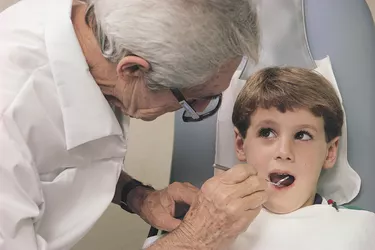
The Supplemental Security Income program is designed to provide financial assistance for low-income Americans who are aged, blind or disabled. The program provides monthly payments to help these individuals pay for basic living expenses. The SSI program is a payment program and does not offer insurance for health and dental coverage. However, people who qualify for SSI will most likely qualify for Medicaid as well. Medicaid provides some basic level of dental coverage depending on your state of residence.
Supplemental Security Income
Video of the Day
The Supplemental Security Income program is a payment program for low-income households. It is a federally funded program designed to provide aged, blind and disabled Americans who have trouble paying for food, clothing and shelter. SSI is paid out of general tax revenues and not out of the Social Security fund. To qualify, a person must be living in the United States, must be a citizen or permanent resident, must have limited income and must be either blind, disabled or over the age of 65.
Video of the Day
SSI Dental Coverage
The SSI program is a payment program and does not offer health or dental insurance. The recipient of SSI benefits is to use the payments to provide for his basic survival needs. The government expects that a portion of the payments are to be spent on medical or dental bills. The SSI program gives monthly payments that can used to pay for dental coverage, but does not formally provide dental insurance through the program.
Medicaid
If a person qualifies for SSI benefits, she will likely also qualify for the Medicaid program. Medicaid is a state-run program for low-income households. Through Medicaid, low-income households are given a form of health insurance for doctors, hospital visits and surgery. Whereas SSI makes cash payments to you, Medicaid only makes payments to health providers. The two programs work together to provide healthcare and a basic income to people in need.
Medicaid Dental Coverage
Because Medicaid is a state-run program, each state offers different coverage amounts and benefits. Dental coverage is one benefit that varies between states. All people under 21 years of age are eligible for basic dental care in every state. For people over 21, whether they receive dental coverage depends on their state. You should contact your state's Medicaid office and ask if dental coverage is offered in your state through Medicaid.